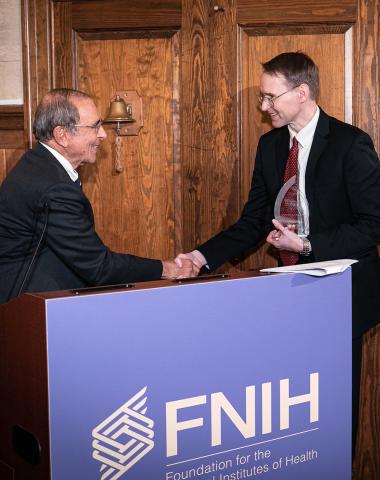NCI’s Kochenderfer Wins Trailblazer Prize

Advances in cancer immunotherapy—a treatment that harnesses the body’s immune system to destroy malignancies—are showing great potential against certain types of cancer. NIH recently celebrated one of its own, Dr. James Kochenderfer, an investigator in NCI’s Surgery Branch, for his pioneering work developing T-cell transfer therapies for blood cancers.
In October, the Foundation for the NIH (FNIH) awarded Kochenderfer the second annual Trailblazer Prize for Clinician-Scientists, recognizing his outstanding research contributions that have led to innovations in patient care.
Kochenderfer’s research focuses on treating leukemia, lymphoma and multiple myeloma, the three major types of blood cancer, all of which usually are fatal. To date, his team has had the greatest success treating lymphoma.
“With lymphoma, we have patients who would have a life expectancy of 6 months or less who have been in remission now for more than 5 years,” said Kochenderfer. “It’s exciting because it’s a totally new type of treatment, using the patient’s own T cells to fight and eliminate cancer.”
T cells are a type of white blood cell involved in the body’s immune response. In CAR-T cell therapy, some of the patient’s T cells are removed and genetically engineered to proliferate and produce new surface proteins called chimeric antigen receptors (CARs). The modified immune cells are then infused back into the body where they identify and attack cancer cells. The novel treatment has proven effective for some hematologic malignancies.
“My whole career has been focused on CAR-T cell therapies,” said Kochenderfer, who arrived at NCI in 2002. He was the first to demonstrate the effectiveness of anti-CD19 CAR-T cells in humans, leading to the first FDA-approved CAR-T cell therapy for lymphoma.
In 2009, a patient arrived at NIH with a high disease burden of lymphoma. After treatment, the lymphoma shrank.
“He was the first patient ever to show that anti-CD19 CAR-T cells were actually effective in humans,” said Kochenderfer.
The patient had a recurrence the following year. After another round of CAR-T cell treatment, the patient remains in complete remission nearly 10 years later.
CAR-T cells are very specific and require a good target, Kochenderfer explained. Currently, the treatment is effective only for blood cancers, though other NCI investigators are working to find viable targets for solid tumors.
For patients with chemotherapy-resistant diffuse B-cell lymphoma, the most aggressive type of lymphoma, the protein CD19 from the cell’s surface is the target.
“It’s not a guess as to what might happen,” said Kochenderfer. “We specifically put a gene into the T cell and it binds to a specific target on the malignancy.’
Kochenderfer recently began going after another blood cancer target. He invented and recently led the first clinical trials to test anti-B-cell maturation antigen (BCMA) CAR for the treatment of multiple myeloma. His team has had some success, he said, though so far the remissions have not lasted as long as they do for his lymphoma patients.
The Trailblazer Prize, made possible by a donation from Drs. John and Elaine Gallin, honors early-career clinician-scientists and bestows a $10,000 honorarium for their critical role in biomedical research and clinical care. FNIH’s Charles A. Sanders Legacy Fund also awarded Kochenderfer and three prize finalists—extramural investigators working on drug delivery, neurology and genomics—$5,000 in support of their laboratories.
Kochenderfer and his lab continue to design new CARs, hone them in preclinical experiments and test the most promising ones in phase 1 clinical trials. He currently has a lymphoma protocol as well as two clinical trials for multiple myeloma, targeting different antigens.
“It’s a great honor to be recognized for all the hard work that’s gone into [developing these treatments],” said Kochenderfer, “and it’s greatly appreciated that FNIH supports translational research.”
